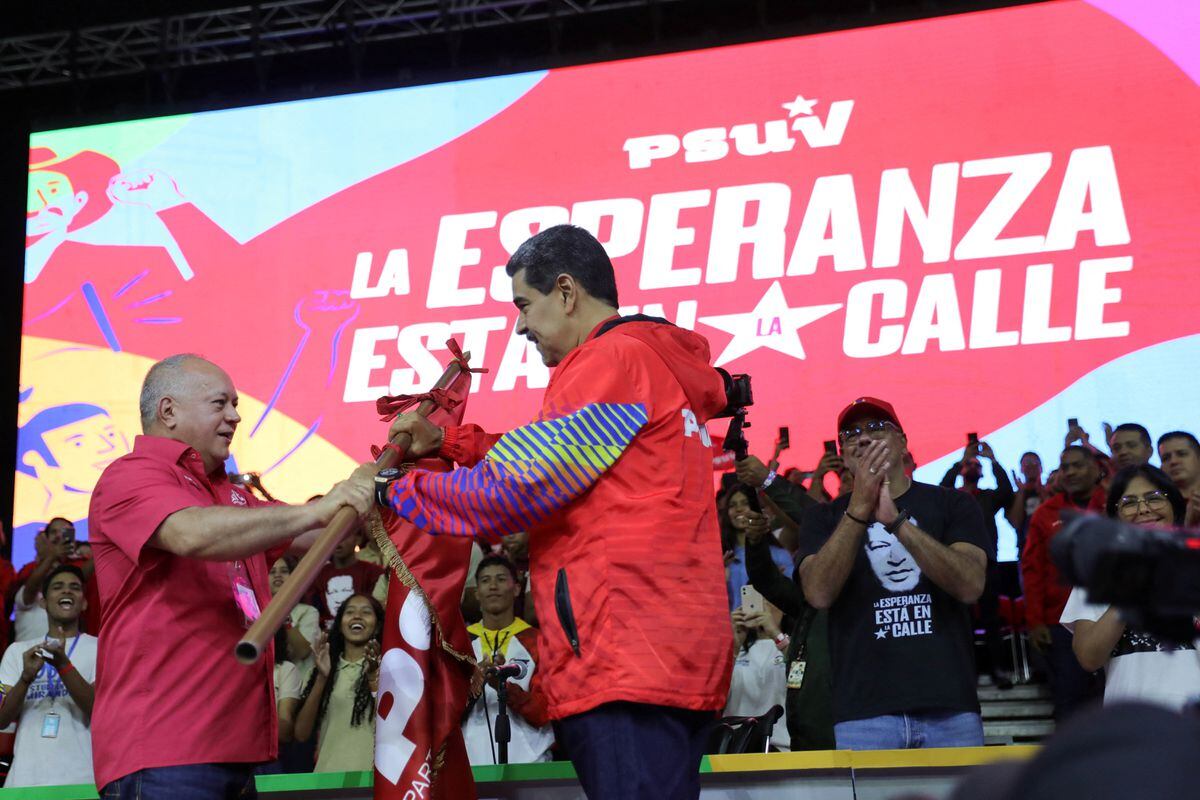The vice president of the United Socialist Party of Venezuela gives President Nicolás Maduro this Saturday the flag that accredits him as the presidential candidate of Chavismo for the presidential elections on July 28, in Caracas, Venezuela. Miraflores Palace (via REUTERS)
There were no surprises.
The Extraordinary Plenary of the V Congress of the ruling United Socialist Party of Venezuela, meeting in the Poliedro of Caracas, named, by absolute unanimity, Nicolás Maduro, current president of the Republic, as the presidential candidate of the revolutionary forces for the presidential elections of the July 28 of this year.
It was a meeting that brought together about 10,000 people, in which the senior political staff of the Chavista ruling party was present, most of them dressed in shirts with the face of Hugo Chávez, the founder of the movement and the party, a figure who was praised and permanently remembered by attendees.
The children of the commander who died in 2013, his parents and brothers were present at the event.
The organizers of the meeting and the Ministry of Communication and Information, Freddy Nañez, stated that the unanimity achieved was the product of the will of just over 4,000,000 militants, "in 317 thousand base assemblies."
Maduro was preceded by several speakers who passionately praised his leadership, and was finally introduced by Diosdado Cabello, first vice president of the PSUV, who praised the political achievements of his partner in the midst of the storms, stating that the fundamental ones are two: “Maintain the peace of the country in the face of adversity, and maintaining the unity of the revolutionary forces, doing politics, giving classes to those who did not believe in him and believed themselves superior.”
In a ceremonious process, as an oath, Cabello presented Maduro with the red flag with the party logo, affirming.
He said at that time: “I am sure that in his hands the homeland will not be lost, the revolution will not be lost.”
With a presidium in which one could read
Hope is in the Street
- the slogan with which Hugo Chávez Frías began touring Venezuela in the mid-90s, once he was pardoned for the coup d'état he promoted in 1992 -, Maduro took the floor and affirmed that he had thought “very well” about the responsibility he had to assume as a candidate and president of Venezuela until 2030. “I accept the presidential candidacy, I assume it, and with the support of the people we will go to a new victory for the Bolivarian forces.
Maduro recalled the difficult moment in which he accepted the entrustment that Chávez left him before he died in 2013, and made new allusions to the stormy years of his government, of enormous economic and social chaos, for which he blamed the opposition.
"To Capriles, to Machado, to López, to Julio Borges, to the names of the oligarchy, for the economic war, the conspiracies, the sabotage of the electrical service, the assassination attempts and the coup d'état that have been attempted against us," he stated.
“They - the opposition - wanted to do in Venezuela what they have done in Haiti, in Ecuador, fill the country with violence,” continued Maduro.
“They couldn't beat us.
Our slogan, our goal, on every block, on every street in the country, is peace.
We have improved a lot with citizen security, we have the best security rates on the streets in the last 60 years, thanks to our peace quadrants strategy, thanks to the participation of the people.”
He added: “I don't care: censor me, persecute me, ban me, but here there is only one destiny: the popular victory of July 28,” he stated, in a paradoxical statement, as if he were his own opponent, predicting with enormous impetus his rivals who “won’t be able to beat us.”
Meanwhile, slogans were heard in unison, saying "The one who goes is Nicolás", or "Hey oligarchs, listen to surnames, the people, united, will never be defeated."
With this investiture, the journalistic versions that promoted with some insistence the improbable existence of an “outsider”, or alternative candidate in the ranks of the ruling party, are finally dissolved - such as the governors Héctor Rodríguez, of the state of Miranda, or Rafael Lacava, of the state Carabobo, two of his closest cadres - willing to take over in the face of the very clear fall in the sympathies of Maduro and Chavismo as a movement in all credible opinion polls in the country.
Just in January, Maduro himself had told Spanish journalist Ignacio Ramonet that he “didn't know” if he would finally be the PSUV candidate in the presidential elections.
Meanwhile, the high revolutionary government has been hardening its tone and making increasingly unilateral decisions in its differences with the Venezuelan opposition, prosecuting activists and violating an important part of what was agreed in Barbados three months ago.
Although it is a small political current, very far from its moment of glory as a mass movement, Chavismo in the hands of Maduro has become, like never before, and with military backing, an entity attached to the Venezuelan State, with certain levels of effectiveness in agitation and propaganda, and some popular anchorage, already a minority, in the population, particularly the poorest.
In most surveys in the country, acceptance of Maduro and adherence to Chavismo as a movement is between 18 and 25 percent of the population.
Follow all the information from El PAÍS América on
and
X
, or in our
weekly newsletter
.

